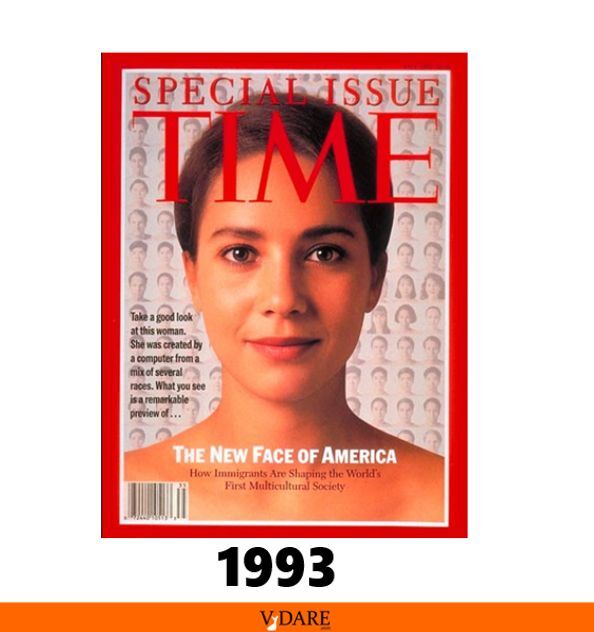


03/09/2024
I started writing opinion journalism in 1990 during the Political Correctness era, so I recall vividly that Woke 2020s are much like the PC era of the early 1990s, only more so. Basically, we had the same trends back then for the same reasons, only now they are much more severe and stupid.
That would seem to vindicate those of us who were worried about political correctness over three decades ago, but the Washington Post’s Philip Bump, who is sort of the Wrong Me, argues that because brilliant journalists like Time’s late William Henry III were worried about PC in 1993, that nobody should worry about Wokeness now.
A warning about colleges focusing too much on diversity … from 1993
Analysis by Philip Bump
National columnist
March 4, 2024 at 6:00 p.m. EST“What does it mean to be [woke]?” an essay in Time magazine asked readers. The author offered some qualifications: “one must be pro-feminist, pro-gay rights, pro-minority studies, mistrustful of tradition, scornful of Dead White European Males and deeply skeptical toward the very idea of a ‘masterpiece,’ because it implies that one idea, culture or human being can actually be better than another.”
These are familiar notes for any reader who is tracking the debate over diversity on college campuses. In fact, the entire essay — titled “The Politics of Separation” — trod this now well-worn terrain, from skepticism at demanded consideration of diversity to an anecdote about student newspapers including an essay critical of Martin Luther King Jr. being stolen in opposition to “institutional racism.”
But this was not a recent article. It wasn’t even about what it means to be “woke” but, instead, what it means to be “politically correct.” Because that was the term of art back when this particular collection of now-tired arguments was assembled in 1993.
The first anecdote in the essay by William Henry III centers on the backlash against UCLA’s decision against the creation of a Chicano studies department. Henry scoffs at the limited scale of the protests — only five students engaged in the hunger strike! — and reports that the administration ultimately backed down.
In 2021, there were over 600 students taking classes through the department, now called the UCLA César E. Chávez Department of Chicana/o and Central American Studies. The Hispanic population in the United States grew from about 9 percent of residents in 1993 to 19 percent last year. UCLA, needless to say, survived.
Henry then pivoted into a criticism of the University of California at Berkeley, which “[a]fter a debate admittedly more political than scholarly,” mandated that students study at least three of five ethnic groups, including European, Latino, Black, Asian and Native American. That requirement is still in place; Berkeley is still one of the top universities in the country.

In fairness, Henry didn’t explicitly anticipate that these efforts would doom the respective institutions. He just pointed at the shift in a disparaging manner, over and over. The essay ran in a special issue of Time focused on the evolving demographics of the country and Henry nodded to that theme — albeit not with favorable acceptance.
“With America moving toward an era when there may be no ethnic majority, with whites just another minority, multicultural and p.c. demands are spreading to previously unbesieged institutions,” he wrote. “Ethnic studies have been mandated at such heartland schools as the University of Wisconsin and Texas A&M.”
That Henry was unable to understand why Texas A&M might consider how diversity might evolve certainly does not speak well to his predictive powers.
“[T]he focus of p.c. multiculturalism seems to be shifting from curriculum battles — so many have already been won — to the suppression of ‘hate speech,’” Henry continued, “which is loosely defined as anything that any recognized minority or victim group chooses to find offensive.”
Henry then transitioned into what New York University researcher Eric Knowles and his colleagues dub the “minority collusion” idea — the overwrought theory that non-White groups work together in the suppression of Whites. (Ask non-White residents of Los Angeles in the early 1990s the extent to which they were unified.) “Often such coalitions add up to a majority,” Henry wrote, “but they cling to rights based on minority status.”
The victims of this collusion? White people. Conservative White men, specifically — exactly the group that Knowles’s research found were most convinced that such collusion exists.
“When white male conservatives feel harassed,” Henry wrote, “multiculturalists retort that they are enabling these fellow students to share in the sense of disenfranchisement, enriching their understanding of the world.”
He pressed forward, marveling that there were no repercussions for students who confronted the author of an essay that described homosexuality as “a dirty, sinful lifestyle that doesn’t deserve any special rights.” And so on.
“[T]he movements demand that mainstream white Americans aged 35 and over” — those now 65 and over — “clean out their personal psychic attics of nearly everything they were taught — and still fervently believe — about what made their country great,” Henry wrote. “Like the black and women’s movements before them, the new movements rely heavily on the unwelcome rhetoric of guilt.”
Finally, the warning —
“Many distinguished scholars … see firsthand evidence that the p.c. and multicultural movements are leading to a more general separatism, a fragmentation of the centrist consensus that built America.”
— and the slippery slope.
“The greatest intellectual danger of political correctness is its assumption that there are some ideas too dangerous to be heard, some words too hurtful to be allowed, some opinions no one is ever again permitted to hold.”
We can look back over the expanse of the past 30 years and declare that there is no shortage of opinions that people are still permitted to hold.
Huh?